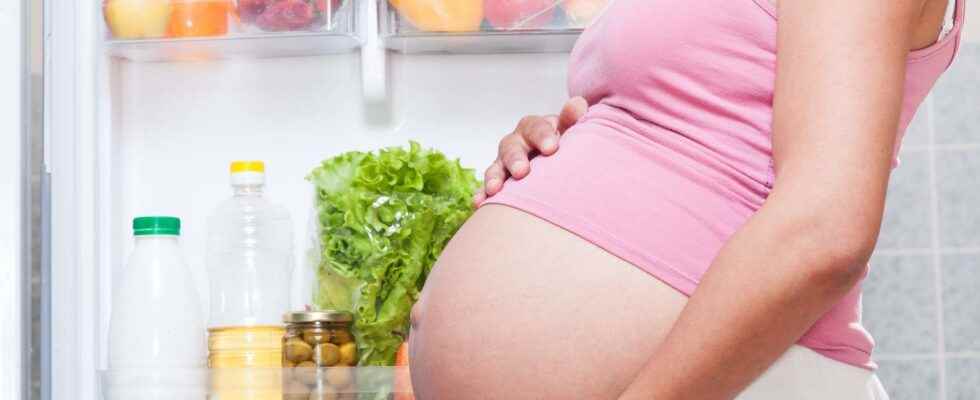Pregnant women have increased and specific needs. Good nutrition is essential for the healthy development of the fetus. Here are the foods to favor and those to avoid absolutely.
You will also be interested
The diet of the pregnant woman is essential for the future health of the baby. It must be both sufficient and diverse to ensure the growth and development of the fetus. According to ANSES, the energy needs of pregnant women increase by 70, 260 and 500 kcal / day on average during the 1er, 2e and 3e quarters of pregnancy. THE’Handles recommends, for example, an intake of protein increased by 10% during the first two quarters and by 12% during the third.
- Fruits and vegetables: at least 5 per day, making sure to wash them well. Favor vegetables rich in vitamin B9 (spinach, asparagus, salads, Brussels sprouts, cauliflower, broccoli, celeriac, beetroot…), beta-carotene (carrots, sweet potatoes, spinach, pumpkincabbage, salads, melon, tomatoes and apricots), as well as fruits rich in vitamin C (kiwi fruit, strawberriesoranges pineapple, grapefruits …)
- Starchy foods: at each meal, diversifying sources as much as possible (rice, pasta, semolina, legumes, potato…)
- Dairy products: three per day, focusing on those richest in calcium and the least salty.
- Water: at least 2.3 liters per day, one and a half liters being supplied by food. It is therefore necessary to drink 0.8 liters in the form of still water.
- Meat: favor meats rich in iron (beef, rabbit, duck, pigeon and quail).
- Fish: marine fish, especially oily fish such as Salmon or herring, the eggs of fish and seafood are important vectors ofiodine (iodine requirements being increased in pregnant women due to the stimulation gland thyroid by the hormones pregnancy). Seafood such as clams, clams, clams, octopus, mussels, anchovies, squid and whelk present them an interesting contribution in iron.
- Certain micronutrient deficiencies can pose risks ofanomalies congenital fetal or obstetric complications. Vitamin D deficiency may thus increase the risk of preeclampsia, premature birth or an underweight baby. The vitamin is found in fatty fish, egg yolks or fortified milk.
- A report in Fatty acids omega-6 / omega-3 too high, in particular due to a very insufficient supply of Fatty acids omega-3, has been associated with poorer cognitive development in children. Hence the importance of consuming enough of these omega-3s, which are found in particular in oily fish (salmon, sardines, mackerel, etc.).
Pregnancy: foods to avoid
- Alcohol is strongly discouraged, especially during the first trimester when most birth defects can occur. Public health France even recommends total abstinence, but a glass of champagne will still be tolerated for the holidays!
- Present in particular in the soy or margarines enriched with phytosterols, phytoestrogens may disrupt the hormonal balance of the mother and the fetus (increased risk of testicular cancer and breast). ANSES recommends that pregnant women not exceed one food containing soy per day.
- Due to the presence of mercury, which presents a high level of toxicity for the nervous system of the baby, the consumption of fishpure water strongly bioaccumulative (eel, barbel, bream, carp and catfish) should be limited to once every two months for pregnant women. Likewise, the consumption of wild predatory fish (monkfish, bar, bonito, eel, emperor, pomegranate, halibut, pike, sea bream, ray, tuna…) must be limited; that ofswordfish, marlin, shark and lamprey are to be avoided completely.
- Caffeine is likely to cause growth retardation in the fetus. It is therefore recommended not to exceed three cups of coffee per day. Likewise, the energy drinks containing high doses of caffeine are not recommended for pregnant women.
- Raw milk or soft cheeses and crust flowery (Camembert, Brie …), cheeses sold grated, shellfish, raw or undercooked meats, are not recommended due to the risk of bacterial contamination.
Interested in what you just read?
Subscribe to the newsletter The health question of the week : our answer to a question you ask yourself (more or less secretly). All our newsletters
.
fs7
